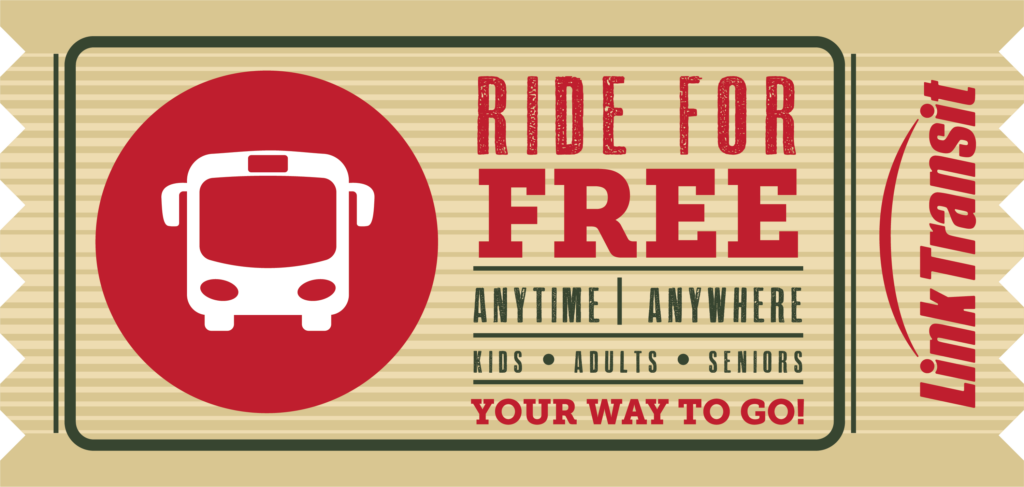Fares

All Link Transit fixed route, DART and paratransit service is now zero-fare. No fares are being collected on any route.
What are zero-fare systems?
Zero-fare transit systems collect no fares from passengers when boarding a vehicle. Some agencies refer to this as “fare-free.” In this case, however, fares would be “pre-paid” through sales tax revenue.
Why did Link Transit consider becoming a zero-fare system?
Link Transit made a commitment to the community after the passage of Proposition 1 to fulfill a number of community-defined priorities, including making fare collection more efficient. After careful review of a number of different options, Link Transit determined that zero-fare offers the most economical, effective and fastest way to deliver the transformational service voters wanted.
What are the expected benefits of zero-fare service?
Zero-fare transit systems report many benefits. Going zero-fare increases ridership which in-turn improves the environment and reduces congestion. It enhances access and equity making communities more livable. Eliminating the fare reduces barriers both for those individuals that can afford to pay as well as those that cannot. And zero fare makes boarding easier and faster which reduces travel times for all.
Did Link Transit consider any other options to becoming a zero-fare system?
Yes, many other options were considered, including a simplified fare structure, magnetic swipe cards, contactlesss RFID cards, mobile flash passes and other new technologies. Many existing and potential new riders asked us for electronic or digital fare payment options. We found that investing in the capital and the operating expenses of a new fare collection system would cost us more than we were going to collect in fares. That’s not a good value proposition.
How can Link Transit afford not to collect fares?
Fares account for less than 5% of our net revenue. After considering the capital and operational costs of a new system, the difference is negligible. The opportunity to offer faster service, increase ridership, improved access and equity is a far better investment.
Will Link Transit have to cut service because fares are no longer collected?
No. Link Transit is expanding service per the mandate voters approved in 2019. In fact, after accounting for the costs associated with fare collection, fares amount to less than 5% of total annual operating revenue. That amount is not enough to impact service.
What are the potential drawbacks and what is Link Transit doing about these?
Peer systems report very few problems or challenges related to zero-fare programs. Nonetheless, we are working to address several issues noted by peer agencies as follows:
- Perception: Some people resent “subsidizing transit” when they don’t use it. However, everyone benefits from reduced congestion, fewer carbon emissions and knowing that friends and relatives can access employment and medical appointments regardless of income.
- Safety: Some worry that “if anyone can ride,” transit will become less safe. Link Transit already has strong rider code of conduct. Our Operators and Operations Supervisors are well trained to address issues if they arise.
- Overcrowding: Some peer systems experience overcrowding immediately following the introduction of zero-fare. Link Transit currently has excess capacity to absorb additional ridership, so we don’t think this will be an issue. In addition, new buses and more frequent service are planned and being added to major routes.
What other transit agencies operate zero-fare service?
Zero-fare systems typically operate in three types of communities: small urban areas, resort and university towns. Systems that most-closely reflect the zero-fare program Link Transit implemented include Intercity Transit (Olympia, WA), Mountain Line (Missoula, MT), and Corvallis Transit System (Corvallis, OR). Additional zero-fare systems in Washington State include Mason Transit, Jefferson Transit and Island Transit.
Are there any other benefits to zero-fare service I should know about?
Yes. We previously managed a wide range of fares, passes and programs. With zero-fare, our customers and our drivers no longer have to spend the time making sure that they have the correct pass, sticker or dollar value, speeding up travel. Additional staff time is saved by not having to produce and distribute fare media, install and repair fare boxes and count money.
Another incredible benefit is the opportunity to recruit new businesses to our area. This means greater employment opportunities and adds dollars to our economy.
No fare does not mean no rules. Problem riders will not be allowed to ride, and continuous riding is not allowed.


